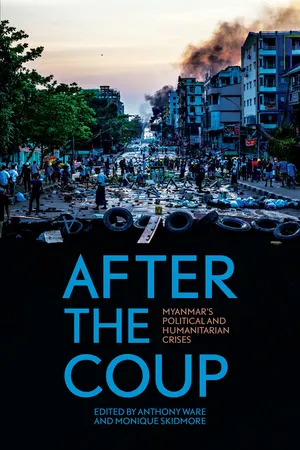
- 348 pages
- English
- PDF
- Available on iOS & Android
About this book
The coup in Myanmar on 1 February 2021 abruptly reversed a decade-long flirtation with economic and political freedoms. The country has since descended into civil war, the people have been plunged back into conflict and poverty, and the state is again characterised by fragility and human insecurity. As the Myanmar people oppose the regime and fight for their rights, the international community must find ways to act in solidarity. There is an urgent need for new policy settings and for practical engagement with local partners and recipient groups.
The contributors to After the Coup offer timely insights into ways international actors can try to reduce the suffering of millions of citizens who are again being held hostage by a brutal and self-serving regime. Chapters analyse topics including coercive statecraft, international justice, Rakhine State (Rohingya) dynamics, pandemic weaponisation, higher education, non-state welfare and aid delivery, activism from exile, self-determination and power sharing in the National Unity Government's alternative constitution, and the roles of China and the Association of Southeast Asian Nations.
Frequently asked questions
- Essential is ideal for learners and professionals who enjoy exploring a wide range of subjects. Access the Essential Library with 800,000+ trusted titles and best-sellers across business, personal growth, and the humanities. Includes unlimited reading time and Standard Read Aloud voice.
- Complete: Perfect for advanced learners and researchers needing full, unrestricted access. Unlock 1.4M+ books across hundreds of subjects, including academic and specialized titles. The Complete Plan also includes advanced features like Premium Read Aloud and Research Assistant.
Please note we cannot support devices running on iOS 13 and Android 7 or earlier. Learn more about using the app.
Information
Table of contents
- Acronyms
- Contributors
- 1. Post-Coup Myanmar’s Political and Humanitarian Crises
- 2. Scenarios for Understanding Myanmar’s Political and Humanitarian Crises
- 3. The Role of Social Media and Disruptive Technologies in Post-Coup Democracy Activism
- 4. Multinational Enterprise Behaviour in Post-Coup Myanmar
- 5. Politics, Justice and Accountability: Myanmar and International Courts
- 6. China–Myanmar Relations after the 1 February Military Coup
- 7. Myanmar in ASEAN: Dilemmas, Determinants and Capacity
- 8. The Federal Democracy Charter: A Path to Inter-Ethnic Peace in Post-Coup Myanmar
- 9. Rakhine State Post-Coup: Arakan Army State-Building and Its Implications for Rohingya and Aid
- 10. Evolution of Communal Tensions in Rakhine State after the Coup
- 11. Pandemic Weaponisation and Non-State Welfare in Pre- and Post-Coup Myanmar
- 12. Localisation, Good Humanitarianism and Solidarity-Based Approaches to Aid in Myanmar
- 13. Relief as Resistance: (Re)Emergent Humanitarianism in Post-Coup Myanmar
- 14. Myanmar’s Higher Education Sector Post-Coup: Fracturing a Fragile System
- 15. The Aftermath: Policy Responses to Myanmar’s Political and Humanitarian Crises